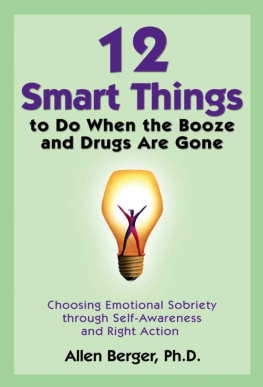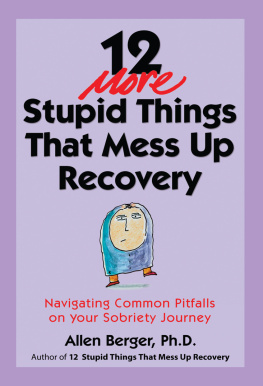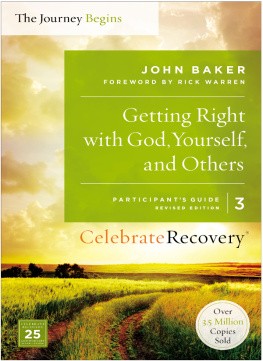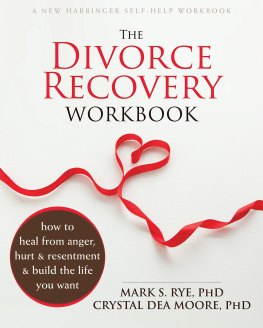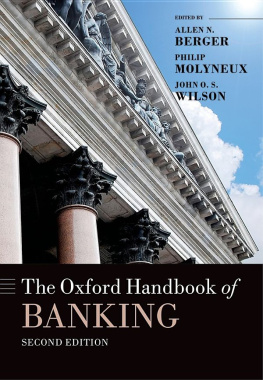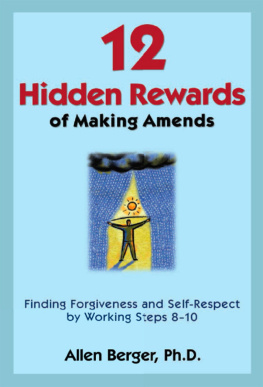12 Hidden Rewards of Making Amends
Hidden Rewards
of Making Amends
Finding Forgiveness and Self-Respect
by Working Steps 810

ALLEN BERGER, PH.D.

Hazelden Publishing
Center City, Minnesota 55012
800-328-9000
hazelden.org/bookstore
2013 by Allen Berger
All rights reserved. Published 2013.
No part of this publication, either print or electronic, may be reproduced in any form or by any means without the express written permission of the publisher. Failure to comply with these terms may expose you to legal action and damages for copyright infringement.
Library of Congress Cataloging-in-Publication Data
Berger, Allen, 1952-
12 hidden rewards of making amends: finding forgiveness and self-respect by working steps 8-10 / Allen Berger, Ph.D.
pages cm
Includes bibliographical references.
ISBN 978-1-61649-494-0 (e-book) 1. AlcoholicsRehabilitation. 2. Twelve-step programs. 3. Interpersonal relations. 4. AlcoholicsFamily relationships. I. Title. II. Title: Twelve hidden rewards of making amends.
HV5278.B46 2013
616.86106dc23
2013007705
Editors note
Some names, details, and circumstances have been changed to protect the privacy of those mentioned in this publication.
This publication is not intended as a substitute for the advice of health care professionals. Alcoholics Anonymous, AA, the Big Book, the Grapevine, AA Grapevine, and GV are registered trademarks of Alcoholics Anonymous World Services, Inc.
The excerpts from Twelve Steps and Twelve Traditions and the text Alcoholics Anonymous are reprinted with permission of Alcoholics Anonymous World Services, Inc. (AAWS). Permission to reprint these excerpts does not mean that AAWS has reviewed or approved the contents of this publication, or that AAWS necessarily agrees with the views expressed herein. A. A. is a program of recovery from alcoholism only use of these excerpts in connection with programs and activities which are patterned after A.A., but which address other problems, or in any other non A.A. context, does not imply otherwise.
16 15 14 13 1 2 3 4 5 6
Cover design: David Spohn
Interior design and typesetting: Madeline Berglund
Developmental editor: Peter Schletty
Dedication
This book is dedicated to William C. Rader, M.D., my first clinical supervisor, who taught me to trust my intuition and the value of authenticity in the client-counselor relationship. To Walter Kempler, M.D., my mentor in Gestalt therapy, who taught me the power of the present moment as the focal point of therapy, and how to confront someone and honor his or her dignity at the same time. To Tom McCall, my sponsor, who taught me the importance of being open, honest, and willing. To Bill B., who was my close friend and fellow traveler at the Kaneohe Marine Corps Air Station. And finally, this book is dedicated to my clients, who gave me the privilege of joining them on this sacred journey and who have helped me grow as a person and as a therapist.
Contents
When you sit alone, quiet and free from distractions, are you at peace with yourself? Are you truly happy with how you are living your life? Are you deeply satisfied with how you behave in your relationships? Are you at peace with how you treat coworkers, friends, and family?
If you give yourself permission to be rigorously honest with yourself, and I mean gut-level honest with yourself, what happens? What comes into the foreground of your consciousness?
Most of us avoid this level of soul searching, this true-speaking and honest self-reflection. Why? Because we really dont want to feel our pain or our disappointment with ourselves. We dont want to face our dissatisfaction with ourselves. We dont want to admit that we arent at peace with ourselves, that we are discontent with how we are living our lives.
None of us wants to admit that weve disappointed ourselves! So we avoid ourselves. We run away. We trick ourselves into believing that we are someone we arent. We avoid facing ourselves honestly and openly. We believe that we are the fabricated-self that we have constructed to meet lifes challenges.
Finding the courage to be rigorously honest would help us develop the best possible attitude toward our relationship with ourselves, with others, and even with life itself. We would learn from our experiences and set upon the path of realizing our full human and spiritual potential. We would accept ourselves, support ourselves, and grow according to who we really are: our true-self. The true-self is purely you. Its the real you. Not the you that was altered by negative childhood experiences, not the you that was shaped by the anxiety about not belonging or not being loved or accepted, and not the you that was changed by our culture. It is the you that you were meant to be.
Unfortunately we rarely have the courage to face and deconstruct our fabricated-self, or false-self. The false-self or fabricated-self is a facade we use to disown our real feelings and manipulate our relationships with others. Its who we think we should be. Its who we think we need to be to relieve the pressure generated by the anxiety that we wont be loved or accepted. Our culture, our families, and even our own psyche conspire against our efforts, against taking this journey, against a gut-wrenching honesty. As M. Scott Peck (1978) pointed out in his book by the same name, this is the road less traveled.
The good news is that there are some pathfinders in our midstpeople who have taken the road less traveled. They took it not because they possess some exceptional virtue in their character that we dont have; rather, they had to take that road or they would die.
I am referring to the millions of men and women who are in Twelve Step recovery. Their addiction induced a crisis that forced them to face themselves honestly. They reached a critical point in their lives that demanded change. They had to find a better way to liveor else! They were motivated to take certain steps to develop the best possible attitude toward themselves and life. They learned how to achieve real peace of mind and emotional well-being. They worked the Twelve Steps. Here are the Steps they took:
The Twelve Steps of Alcoholics Anonymous
Step 1: We admitted we were powerless over alcoholthat our lives had become unmanageable.
Step 2: Came to believe that a Power greater than ourselves could restore us to sanity.
Step 3: Made a decision to turn our will and our lives over to the care of God as we understood Him.
Step 4: Made a searching and fearless moral inventory of ourselves.
Step 5: Admitted to God, to ourselves, and to another human being the exact nature of our wrongs.
Step 6: Were entirely ready to have God remove all these defects of character.
Step 7: Humbly asked Him to remove our shortcomings.
Step 8: Made a list of all persons we had harmed, and became willing to make amends to them all.
Step 9: Made direct amends to such people wherever possible, except when to do so would injure them or others.
Step 10: Continued to take personal inventory and when we were wrong promptly admitted it.
Step 11: Sought through prayer and meditation to improve our conscious contact with God as we understood Him, praying only for knowledge of His will for us and the power to carry that out.
Next page

